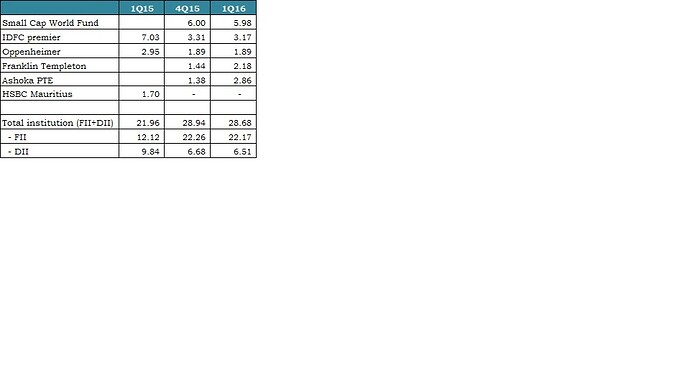It is good to see counterpoints emerging and getting debated. However, what I feel we should desist from is to start raising questions directly on the integrity of the promoters which may not always be in the question when the results are below par or unforeseen event unfold or the cash is not distributed immediately. I do not intend to say that we should not ask tough questions. However, as long term investors who focus on “value”, we may be far better served if we ask these questions when things are normal (business as usual scenario). All the events (except for reduced royalty payments which currently is not provided for as CL) that has prompted some of us to raise doubt about the integrity/intention of the management whether it is the failed attempt to look for a strategic partner, an announcement to diversify in food processing and intended stake sale by promoters, calling of stake sale and selling a part of stake by the time of announcement, has happened in the past and not now. Hence, if we indeed had serious doubts, or were not satisfied with the explanations given by the promoters at for any of these events, raising the concerns at that point of time would have been far more meaningful.
If we start raising these questions just when an unfavourable events unfold, it implies two things
- It indicates that we have not done our due diligence properly or at least have not asked the right questions at the right time to get a conclusive answer for the event/development in question
- It severely impacts our ability to make a decision when the uncertain situation unfolds, as we, like market, start believing that there is something “fishy” and start rationalizing the fall by recounting the past events and draw inferences which in the current context may have little relevance . ( To put it differently, had we asked the questions with same ferocity had the result came rather reasonably good despite of challenging market)
Coming to KSCL specific points
- Most of the boarders knew that the number of variables in the Kaveri business are more than an many other steady compounder businesses like Astral/Page/Eicher etc. Hence, we knew that when any of these variables play out adversely, there is going to be a negative impact on company’s financials. (So we knew monsoon, preference for cotton crop (a function of cotton price) vs other crops, successful product launches, government regulation etc are some of the variables and may have material impact on company’s financial).
The duration and significance of the adverse impact on company’s financials will be different in case of each variable (or a combination of these variables) playing out. So, in my opinion what has played out is the combination of many variables (i.e. A draught last year coupled with very low cotton prices forcing government to cap/reduce the prices; low cotton prices with draught this year in some parts leading shift to other crops) thus hitting the company really hard.
On top of it, company adopted a strategy not to focus on credit market to contain the risk of defaults. This to me is not a bad strategy, especially considering that they had much lower inventory than planned (shortfall of about 20 lakh packets due to lower seed production at farms hit by unseasonal rains) and lack of cash available with farmers due to back to back draughts that will put receivables of the company under stress. However, it did have impact on the top-line of the business in near term.
I quite agree with a view that as an investor we shall reduce 64 Crores of royalty saving from profit (irrespective of the accounting treatment given by company) and make our calculations based on that. After reducing that amount, what is the risk-return profile over next 3-5 years considering that some of the years may be challenging for the company and few variables that have played out adversely may play out again or few that has not yet played out may play out as well? Considering this,does the odd exist for an investors to make good upside with limited downside?
Having said that, one lesson that has been reaffirmed to me is to have our own independent view instead of getting swayed by what management believes (to be fair, in all businesses, management tend to be optimistic and at times have no clue as to how some events may unfold or impact such unforseen event may have on the company). So in case of Kaveri,
- My understanding of management’s commentary (and probably some of the other boarders as well) was that draught does not have significant impact on KSCL’s cotton business. Now, this statement may be partially true in terms of direct impact ,but draught does have (and it did have!) an impact on company’s cotton business.
- Another impression I got was that amongst all the crops, even at lower cotton prices, cotton remains the most attractive crop for farmers. However, current situation suggests that there is a shift in crop preference from cotton to other crops due to other crops being more attractive to farmers.
- Till May, everybody in the industry( not only Kaveri) was positive that there will not be reduction in cotton seed prices. However, governments have their own agenda and preferences and does not always act in the most rational way. Thus, eventually, within a month, the prices in Maharashtra were reduced by Rs. 100.
So, one should not take management’s commentary on face value and keep one’s thinking hat on.
Discl: Had a small position, Added more after results and fall.

